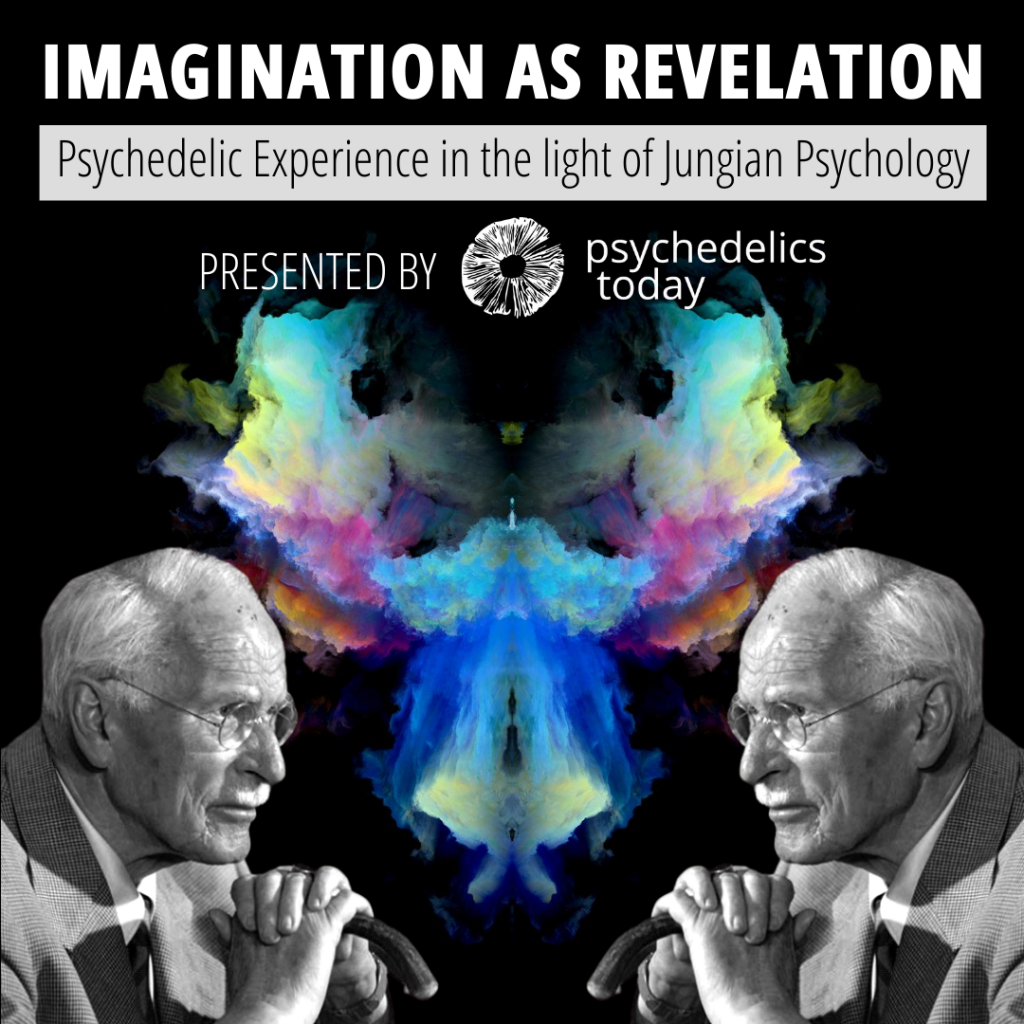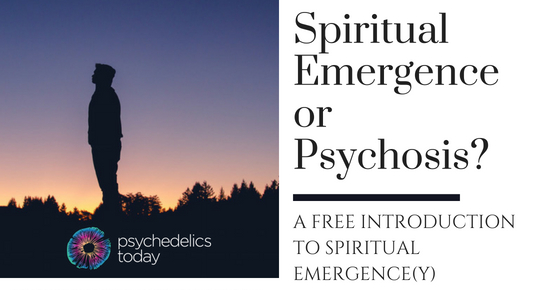By Jasmine Virdi
Defining transpersonal psychology, exploring its history, and examining how it relates to psychedelic experiences.
Transpersonal psychology, the branch of psychology that concerns itself with the study of spiritual experience and expanded states of consciousness, has often been excluded from traditional psychology programs. However, as we traverse the reaches of the psychedelic renaissance and interest in the healing potential of non-ordinary states of consciousness continues to grow, understanding transpersonal psychology is of growing importance.
What Is Transpersonal Psychology?
Sometimes transpersonal psychology is referred to as “spiritual psychology” or “the psychology of spirituality” in that it is the branch of psychology that concerns itself with the domain of human experience that is not limited to ordinary, waking consciousness, transcending our typically defined ego-boundaries. As a discipline, transpersonal psychology honors the existence and latent wisdom contained within non-ordinary experiences, concerning itself with unravelling the implications of their meaning for the individual, but also for the greater whole. It attempts to combine age-old insights from ancient wisdom traditions with modern Western psychology, trying to encapsulate the full spectrum of the human psyche.
Prior to the inception of transpersonal psychology, the idea that psychologists should study spirituality was unheard of. Compared with traditional psychological approaches, transpersonal psychology takes a non-pathologizing approach to spiritual experience and non-ordinary states of consciousness.
Reflecting on the origins of the discipline, psychedelic researcher and author, Dr. James Fadiman, offers, “Transpersonal psychology, in its simplest definition, is concerned with understanding the full scope of consciousness, primarily within the human species, but not limited to that which can be described easily by Western science, religious or mystical traditions, nor by Indigenous categorizations.”
“Unlike the rest of psychology, it has not attempted to use the trappings of scientific method to make it more acceptable,” Fadiman adds. “As a result, it has often been identified pejoratively as part of the “new age” counterculture, since it freely investigated states of consciousness and approaches to personal growth and development that were not being looked at by the other psychologies.”
Although Fadiman is generally more well-known for his pioneering work in microdosing, he was one of the prominent figures in shaping the early transpersonal movement. Together with psychologist Robert Frager, Fadiman co-founded the Institute of Transpersonal Psychology in 1975, now known as Sofia University.

The Birth of a Spiritual Psychology
Transpersonal psychology was formally launched in 1971 by psychologists Abraham Maslow and Anthony Sutich. It emerged as a “Fourth Force” within psychology, with the other three forces being cognitive behaviorism, psychoanalytic/Freudian psychology, and humanistic psychology.
In the 1950s, American psychology was dominated by the schools of cognitive behaviorism and Freudian psychology, however, many felt that these approaches to understanding the human psyche were limited and this growing dissatisfaction led to the birth of humanistic psychology. Humanistic psychology was closely linked to the transpersonal movement in that it was also founded by Maslow and many of the same individuals.
No longer a psychology of psychopathology, humanistic psychology concerned itself with the study of healthy individuals, focusing on human growth and potential. One of Maslow’s main qualms with behaviorism was the limitation of applying animal models to human behavior as this approach would only serve to illuminate the functions that we share with given animals. As such, he felt that behaviorism did not serve to enhance our understanding of the higher functions of our consciousness such as love, freedom, art, and beyond. Additionally, Maslow felt Freudian psychoanalysis was lacking due to its tendency to reduce the psyche to instinctual drives and draw on models of psychopathology.
Humanistic psychology attempted to take a holistic approach to human existence, concerning itself with self-actualization and the growth of love, fulfillment, and autonomy in individuals. Despite the popularity of the discipline, and the new “Human Potential Movement” that spawned around it, Maslow and others felt that there were some critical aspects lacking in humanistic psychology. Namely, the acknowledgement of the role of spirituality in people’s lives.
In 1967, a working group including the likes of Abraham Maslow, Anthony Sutich, Stanislav Grof, James Fadiman, Miles Vich, and Sonya Margulies met in Menlo Park, California with the aim of developing a new psychology that encapsulated the full spectrum of human experience, including non-ordinary states of consciousness. In this discussion, Stanislav Grof suggested the new discipline or Fourth Force should be called “transpersonal psychology.” Thereafter, the Journal of Transpersonal Psychology was launched in 1969, and the Association of Transpersonal Psychology was founded in 1972.
Despite the formal beginnings of transpersonal psychology in the middle of the twentieth century, the movement has its conceptual roots in the early work of William James and Carl Jung, psychologists who were mutually interested in the spiritual reaches of the human psyche. Touching upon the relevance of Jung’s contributions to the field in his book Beyond the Brain, Dr. Stanislav Grof, one of the founding fathers of transpersonal psychology and pioneer in the field of psychedelic research, described Jung as, “The first representative of the transpersonal orientation in psychology.”
William James, father of American psychology, is also perceived to be one of the founders of modern transpersonal thought, making the first recorded use of the term “trans-personal” in a 1905 lecture. However, James’ use of the term was more narrow than the way it is used today. Not only did James’ philosophy contribute to the development of transpersonal psychology, his early experimentations with psychoactive substances, in particular nitrous oxide, have also added substantially to the psychology of mystical experiences and the scientific study of consciousness.
Reflecting on his experience in The Varieties of Religious Experience, James wrote, “Our normal waking consciousness, rational consciousness as we call it, is but one special type of consciousness, whilst all about it, parted from it by the filmiest of screens, there lie potential forms of consciousness entirely different.” It is these very forms of “entirely different” consciousness that transpersonal psychology concerns itself with.

Understanding the Nature of Transpersonal Experience
The term transpersonal literally means beyond (trans) the personal, and as such, transpersonal experiences are those which serve to evaporate and transcend our ordinary, waking consciousness. Although transpersonal experiences are sometimes induced spontaneously, they can also be brought on by contact with nature, engaging in contemplative practices like meditation, sex, music, and even by difficult psychological experiences. They can take place in a variety of forms, whether it be a spontaneously induced mystical state, out-of-body or near-death experience, a unitative state elicited by psychedelics, or even an alien encounter experience.
Transpersonal experiences are inherently transformative in that they usually serve to broaden our self-conception, often providing us with a broader cosmological perspective. Take for example, the experience of ego death, or ego-dissolution as it is referred to in the scientific literature, a type of transpersonal experience that can be triggered by the use of psychedelics. In the ego death experience, the ordinary sense of self fades into an experience of unity with ultimate reality or “cosmic consciousness.”
Such experiences are both fearful and enlightening, but are thought to be one of the reasons why the psychedelic experience is so transformative for so many people. Viewed through the transpersonal lens, ego death tends to be understood as a beneficial, healing process in which an individual is able to let go of old ego structures that are no longer of service, making space for new, more integral ways of being.
Transpersonal experience is not limited to the world as we know it to exist in everyday reality. In a transpersonal experience, one might find themselves projected out of their body, viewing remote events in vivid detail or having encounters with entities from other dimensions. Describing the nature of such states in their book Spiritual Emergency, Stanislav Grof and the late Christina Grof, suggest that they include elements that western culture does not accept as objectively real, such as deities, demons, mythological figures, entities, and spirit guides. As such, they write, “In the transpersonal state, we do not differentiate between the world of “consensus reality”, or the conventional everyday world, and the mythological realm of archetypal forms.”
Such experiences facilitate a sense of harmony and meaning, connection and unity, and self-transcendence which are associated with positive effects such as heightened feelings of love and compassion. However, that is not to say that transpersonal states always have positive consequences, as they can also be incredibly destabilizing and have the ability to cause psychological distress, often referred to as a “spiritual emergenc(y)” in the transpersonal literature.

Why the Need for Transpersonal Psychology?
Science, as it stands today, is limited in its purview. Mainstream science and psychology is largely dominated by materialist approaches to consciousness and mental health. Within the materialist paradigm, matter is considered primary to consciousness, which is believed to be an accidental by-product of complex arrangements of matter. According to Fadiman, “The problem for mainstream psychology has been the unmeasurable core of transpersonal’s interest, namely, human consciousness.”
Fadiman suggests that mainstream psychology has become more and more “scientistic.” That is, it has become dogmatic in its belief that science and the materialist reductionist values that underlie it are the only way of objectively understanding reality. “Psychology is more concerned with statistical significance than personal utility, and its subject matter now includes a remarkable amount of research with animals, where their consciousness can be most easily ignored,” he shares.
Fadiman reflects that transpersonal psychology’s interest in the nature of consciousness and states of consciousness that extend beyond personal identity makes it “at its very best, the ugly stepsister that one leaves at home when going out to join material sciences parties.” Sharing an example of this, Fadiman pointed to the American Psychological Association’s refusal to grant accreditation to a transpersonal graduate school.
“This was not because of the quality of its dissertations which were rated quite highly or for the span and variety of its courses nor because of the financial status of the institution,” Fadiman continues. Rather, “It was turned down solely on the basis of its fundamental subject matter.” In essence, it boils down to the question of materialism, as many transpersonal psychologists believe in some form or another that consciousness cannot be explained by processes of the brain alone.
Almost all indigenous cultures who have used psychedelics for hundreds perhaps thousands of years report that as one’s consciousness expands beyond the perimeters of the identity, that there are other beings, other realms of existence which are met, often across cultures with identical descriptions.
—James Fadiman
Further, Grof describes the dominant scientific perspective as “ethnocentric” in that “it has been formulated and promoted by Western materialistic scientists, who consider their own perspective to be superior to that of any other human group at any time of history.” However, he suggests that transpersonal psychology, on the other hand, has made significant advances in remedying the ethnocentric biases of mainstream science through its cultural sensitivity towards the spiritual traditions of ancient and native cultures, the acknowledgement of the ontological reality of transpersonal experiences, and their value.
The Relevance of Transpersonal Psychology in the Psychedelic Renaissance
The resurgence of interest in the medical, psychological, and transformational benefits of psychedelics has naturally generated increased awareness of transpersonal states and their value for the health of the human psyche. When it comes to the study of spirituality and non-ordinary states of consciousness, transpersonal psychology has long paved the way, validating the veracity and psychological benefits of such states. As such, it offers itself as an important reservoir of knowledge when trying to understand the healing potentials of psychedelics within therapeutic contexts, but also when trying to understand their broader socio-cultural implications.
In spite of not being widely recognized, transpersonal psychology has long led the scientific endeavor to understand the totality of the human psyche through its embrace of non-ordinary states of consciousness that have hitherto been dismissed as “psychotic” or merely “hallucinations” by mainstream science. Fadiman explains that transpersonal psychology continues to take seriously and without judgment the results reported by individuals working with psychedelics. “For example, almost all indigenous cultures who have used psychedelics for hundreds perhaps thousands of years report that as one’s consciousness expands beyond the perimeters of the identity, that there are other beings, other realms of existence which are met, often across cultures with identical descriptions,” says Fadiman.
The conceptual frameworks of the dominant model are inadequate when it comes to understanding non-ordinary experiences, including those elicited by psychedelics. As such, Fadiman suggests that, “As we continue to develop more accurate maps of inner space, it is likely that transpersonal psychology, with its emphasis on subjective as well as objective observation will continue to play a prominent role.”
This article was updated on July 19, 2021 to correct the years the Journal of Transpersonal Psychology and Association of Transpersonal Psychology were founded.
About the Author

Jasmine Virdi is a freelance writer in the psychedelic space. Since 2018, she has been working for the fiercely independent publishing company Synergetic Press, where her passions for ecology, ethnobotany, and psychoactive substances converge. Jasmine has written for Psychedelics Today, Chacruna Institute for Plant Medicines, Lucid News, Cosmic Sister, Psychable, and Microdosing Guru. She is currently pursuing an MSc in Spirituality, Consciousness, and Transpersonal Psychology at the Alef Trust with the future aim of working as a psychedelic practitioner. Jasmine’s goal as an advocate for psychoactive substances is to raise awareness of the socio-historical context in which these substances emerged in order to help integrate them into our modern-day lives in a safe, ethically-integral, and meaningful way.
